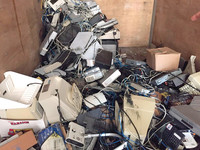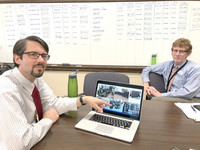By ETHAN HARTLEY When Doug Alexander took over as the technology director of Warwick Public Schools in March of 2016, the first thing he wanted to do, he said during an interview on Wednesday alongside Superintendent Philip Thornton and finance director
This item is available in full to subscribers.
We have recently launched a new and improved website. To continue reading, you will need to either log into your subscriber account, or purchase a new subscription.
If you are a current print subscriber, you can set up a free website account by clicking here.
Otherwise, click here to view your options for subscribing.
Please log in to continue |
|


When Doug Alexander took over as the technology director of Warwick Public Schools in March of 2016, the first thing he wanted to do, he said during an interview on Wednesday alongside Superintendent Philip Thornton and finance director Anthony Ferrucci, was walk around the schools and take stock of the state of technology in the buildings.
“The term that I keep using to describe what I saw was ‘Dell museum,’” he said.
Alexander amassed a report on the school’s technology, and found over 1,000 desktop PCs with an average age of nine years, 17 percent of which had old cathode ray tube monitors (the kind that use the same display technology as an antique television and can be damaged by placing a magnet too close to the screen).
He found aging laptops that didn’t function and overhead projectors outnumbering LCD projectors 150 to 106. In the bowels of some buildings were VHS players from the ’70s, which were among the first commercially available types of VHS players that were manufactured.
“I love that type of stuff,” Alexander said. “But I love it to put on a shelf and talk about it, not use it.”
And so a multiyear effort to “e-waste” old technology and replace it with newer versions began, with the goal of streamlining technology and making it easier to update, manage and secure.
“Ideally, in a perfect world, you want to have one generation of every piece of hardware out there that you know you have all the parts for to maintain. When those age out, you replace them all with new ones and you’ve made your fleet as uniform as possible,” Alexander said. “You want your service to be efficient, you want your parts purchasing and inventory management to be easy and you want the quality of your hardware to always be as high as possible – the reliability, the compatibility, the security.”
In the nearly two years since Alexander took over, the schools have seen the number of Chromebooks increase to about 10,000, about 300 advanced Promethean Boards hooked up in the secondary level classrooms and over 100 iMacs installed in media labs and music rooms across the district. Updated routers have been installed in the secondary level as well to handle the increased draw from wireless devices.
“I feel like we’re reaching the ‘now,’ to then start looking into the future,” he said.
However the process has not been initiated or carried out devoid of controversy.
Teachers have taken issue with how the e-wasting initiative began and how it has been carried out since. Darlene Netcoh, president of the Warwick Teachers’ Union and a 30-year veteran English teacher, said that teachers came back from April vacation in 2016 to find red markings on technology in their classrooms – even on technology that belonged to the teachers themselves.
After teachers reacted strongly against the notion that all their technology would be taken away, the initiative was pushed back to the summer.
However even then, Netcoh said, some technology that shouldn’t have been thrown away was still taken – such as certain items that were awarded through the Rhode Island Teachers and Technology Initiative (RITTI).
“The only reason some teachers had tech in the first place was because of their own efforts,” Netcoh said. “Where did all that technology go? It went into dumpsters.”
Netcoh argued that teachers should be allowed to keep a blend of technology in their classrooms to suit different needs, such as a personal desktop that enables them to load software that may still be CD-based, and pointed to an example of one class being unable to paint a mural on their wall because they had no access to an overhead projector to cast an outline of an image on the wall to use as a guide.
“There needs to be a variety of technology in a teacher's repertoire, just like a teacher needs a variety of teaching strategies,” she said. “An analogy that people have said to me is that if you buy a new iPad, you don’t throw away your laptop.”
Perhaps the most vocal critique of the e-waste initiative has been a lack of proper communication from the administration about its intentions. Indeed, two examples of such a lapse include a Toll Gate teacher whose old Macintosh computer products (his own personal property) were scrapped. He had to be compensated personally for the lost technology.
The most recent incident involved Toll Gate teachers having LCD projectors removed from their classrooms without being notified that it was going to occur. According to Netcoh, it happened right before an examination period. Alexander admitted that although a similar recycling of projectors occurred around the same time at Pilgrim, the mishap at Toll Gate was definitely not the way things should have been handled.
“The Pilgrim tech was aware enough to alert his building administration, and the Toll Gate tech did some unauthorized [overtime] over the weekend and did it without talking to anybody, including me. When I walked in on Monday morning and learned about it, that was the first I knew that had gone on,” he said. “We’re also remedying that situation, partly with procedure and partly with specific measures with him.”
Alexander agreed that better communication is necessary, but also measured that by saying that teachers shouldn’t be leaving personal property in classrooms over the summer in any situation.
“The first steps will be communicate with building administration, identify the hardware and let the teachers know. I agree from a professional perspective, they deserve to know what’s staying and going,” he said. “My plan is to say, this summer, that no personal tech is left in the schools. We can’t risk this again. It’s not about marking – it needs to be out. We need to be able to do a sweep and have confidence that what we’re taking is district owned.”
Netcoh sent an email to fellow teachers’ union members informing them that the City Council Finance Committee will “be investigating the removal of technology from teachers’ classrooms.”
However, according to Ferrucci, the school department finalized a comprehensive process for e-wasting old technology in January of 2016, which is based off Section 56-13 of the Warwick City Charter regarding the sale of surplus, obsolete, unused materials and junk property.
“I wanted everybody to make sure they were aware we were following city procedures,” Ferrucci said, explaining that the e-wasting process involved inventorying the technology in question and providing a list to the city’s purchasing agent, the city council liaison and the city council president. The council then has two weeks to ask for further clarification before the school department can proceed with recycling or junking the materials.
Netcoh still believes that teachers should have more say into what technology is removed or considered obsolete in their classrooms.
“Technology in Warwick needed updating, there's no doubt about it, but the way they went about it is the way they go about everything,” she said, referring to the administration. “They show no respect for the educators in the classroom. They have no idea what our jobs entail.”
2 comments on this item Please log in to comment by clicking here
Justanidiot
master ticklepayers mayer, how can you let this go on. sew muchly money was swpent on this high tech gear and day is trhorwoin it in the trash. millions of taxpayers hard earned moneys just frown way and they are going to want more and more and more. stop this inanities mister mayer
Friday, February 23, 2018 Report this
CrickeeRaven
You have to excuse the mayer, Justanidiot, he's been busy dumping his own version of e-waste all over this site again: Posting incorrect comments about who is the city GOP chairman, insisting that he paid his property taxes when city records prove otherwise, and defending his violations of the city's sign ordinance this year when he followed it in 2016.
I do agree, though, that he should stop the inanities.
Saturday, February 24, 2018 Report this